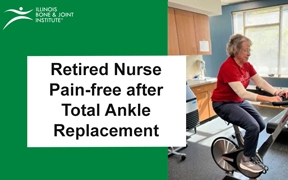Joint replacement surgery can be a step toward a more active lifestyle. The process of planning a surgery with your doctor may cause stress and anxiety. Bringing a list of questions to your appointment before surgery can help to bring peace of mind. Asking questions and learning more about the surgery and recovery process can also help to reduce stress and provide more clarity.
With the help of Jill Branson, BSN, RN, ACM, OrthoSync® Nurse Case Manager at Illinois Bone & Joint Institute (IBJI), we have created a list of questions to ask your physician before going into surgery.
Branson suggests to ask the following questions:
- What improvements in my pain and function can I expect after surgery?
- What can I do before and after my surgery to make sure I have a good outcome?
- Once I am done with the healing and rehabilitation period, will I have any lifelong restrictions or requirements to make sure I am taking good care of my new joint?
- How will my pain be controlled after surgery?
- At what point after surgery are most patients “done” with their rehabilitation period?
- When will I be able to drive after surgery?
- Do I qualify for outpatient joint replacement?
If you are feeling stressed, anxious or scared before your surgery, IBJI is here to help. We are happy to answer all of your questions to ease the stress that can come with planning surgery. If you’re unsure of what to ask your physician, get the conversation started by bringing this list to your appointment. If you think of more questions, our physicians are always here to provide answers and make the process easier to understand.
Kelsey Koziel is a Marketing Communications and Public Relations Specialist at Illinois Bone & Joint Institute.
What is OrthoSync?
OrthoSync® is an innovative program from IBJI that starts with a total musculoskeletal evaluation before surgery to create a customize care plan specifically for you. Rather than a “one size fits all” approach, OrthoSync® strives to take into account all of the factors that can influence your recovery. Learn more »




